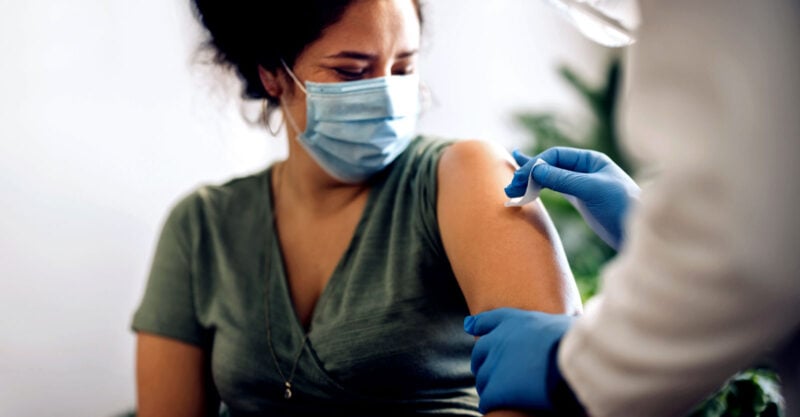10/05/22 •
More Women Than Men Reported Injuries After COVID Vaccine, V-safe Data Show
Data collected from the U.S. Centers for Disease Control and Prevention’s V-safe app reveal that women and also recipients of the Moderna and Johnson & Johnson COVID-19 vaccines were disproportionately affected by adverse events following their vaccination.
Miss a day, miss a lot. Subscribe to The Defender's Top News of the Day. It's free.
Data collected from the Centers for Disease Control and Prevention’s (CDC) V-safe app reveal that women and also recipients of the Moderna and Johnson & Johnson (J&J) COVID-19 vaccines were disproportionately affected by adverse events following their vaccination.
The data were publicized Oct. 3 by the Austin-based nonprofit Informed Consent Action Network (ICAN) following its successful lawsuit against the CDC and a court order demanding the CDC release the data.
ICAN published the data using a graphical online dashboard and also made the raw data — containing more than 144 million lines of health data — available to the public.
The V-safe smartphone app collected post-vaccination health assessments from approximately 10 million people between Dec. 14, 2020, and July 31, 2022.
Del Bigtree, CEO of ICAN, described the data file as “huge, gigantic” and remarked on the CDC’s failure to make this information available.
“The CDC had billions of dollars to build something like this,” he said. “They didn’t do it, so we did it for them.”
Adverse events for Moderna, J&J recipients disproportionately high
According to data presented by Statista, of the more than 610 million COVID-19 vaccines administered in the U.S. as of Sept. 7, 59.2% (361.3 million) were Pfizer, 37.6% (229.8 million) were Moderna and 3.1% (18.9 million) were J&J.
However, the V-safe data reveal that out of the 3.35 million people who reported being affected in some way by the vaccines, 48.3% received the Moderna vaccine and 4.7% received the J&J vaccine.
Both percentages are higher than that of the general population that received those vaccines.
According to ICAN, “These data also reflect a disproportionate amount of negative health impacts, including medical events, following the Moderna vaccine versus the Pfizer vaccine.”
Attorney Aaron Siri, who represented ICAN in its lawsuit against the CDC, highlighted the disproportionate effects reported by Moderna vaccine recipients, telling Fox News:
“The Moderna vaccine, interestingly, even though less shots of it were administered, appears within this data set to have a higher rate of adverse effects.”
Dr. Madhava Setty, a board-certified anesthesiologist and senior science editor for The Defender, suggested the disproportionate percentage of adverse events associated with the Moderna vaccine may be related to Moderna’s larger dose, compared with Pfizer.
“The most likely explanation of the Moderna issue is that there is more mRNA in each dose of their formulation compared to that in Pfizer’s,” he said.
COVID vaccine affected more women than men
The V-safe data also reveal that of the approximately 3.35 million V-safe users who reported one or more adverse events, a significantly higher number of women reported such events.
This includes:
- 1.9 million white women compared to approximately 700,000 white men.
- Nearly 136,000 Asian women compared to approximately 81,000 Asian men.
- More than 161,000 Black or African American women compared to nearly 47,000 Black or African American men.
According to ICAN:
“There was also a disproportionate number of negative events reported by women versus men.
“This is consistent with what was seen in Pfizer’s initial post-authorization safety report sent to the U.S. Food and Drug Administration (a report had to be obtained by lawsuit) which similarly showed a disproportionate number of neurological events experienced by women following the Pfizer Covid-19 vaccine.”
Brian Hooker, chief scientific officer for Children’s Health Defense, told the Defender we may eventually see a shift in some of these discrepancies: “I think, over time, we might see a shift … especially in younger individuals.”
He added:
“I would imagine that cardiac events within adolescent to young adult males will jump off the charts, given what has been reported otherwise.”
The V-safe data also show a significant number of reports of injuries among children and the elderly.
For instance, the figures show that more than 33,000 symptoms were reported for approximately 13,000 infants age 2 or younger. The most commonly reported symptoms included irritability, loss of appetite, pain and sleeplessness.
“These are very concerning since babies cannot speak and hence these symptoms are how they often communicate that something is wrong,” ICAN said.
While the data, at this time, do not provide more specific age breakdowns of V-safe users other than whether they were older or younger than age 3, one of the most commonly reported adverse events was joint pain, affecting 4 million of the 10 million V-safe users.
In response to this finding, ICAN remarked:
“Since V-safe only included less than 4 percent of people that received a COVID-19 vaccine, tens of millions of Americans likely had an immune reaction to the COVID-19 vaccine in their joints that resulted in debilitating pain and potential long-term harm.”
In his Fox News appearance, Siri noted that “It’s not just that it’s 4 million. It’s 4 million out of a group of 10 million people. That makes that number extremely high.”
Commenting on the potential impact on elderly vaccine recipients, Siri said:
“Of those 4 million that reported joint pain — joint pain is an immune reaction, that is something to be concerned about after vaccination — about 2 million of those were moderate — not mild, but moderate — and 400,000 [had] severe joint pain.
“This is a shot that’s intended to help folks who are elderly. Those are the folks that are susceptible to COVID. Making their joints swell, potentially causing long-term issues, that’s not a good idea.”
The V-safe data also show:
- Nearly 71.3 million symptoms were reported by the approximately 10.2 million V-safe users between Dec. 14, 2020, and July 31, 2022.
- Almost 4.2 million symptoms were classified as being severe in intensity.
- More than 3.35 million people experienced adverse events after receiving a COVID-19 vaccine.
- More than 782,000 individuals experienced a health event requiring medical attention, emergency room intervention and/or hospitalization.
- Over 25% of V-safe users experienced an event that required them to miss work or school, or which precluded them from participating in normal activities.
Remarking on the data, Bigtree told the Epoch Times that it “reveals shocking information that should have caused the CDC to immediately shut down its COVID-19 vaccine program.”
Setty told The Defender the number of adverse events requiring medical attention deviates sharply from the published figures from the Pfizer COVID-19 vaccine trial and calls those trials into question.
He said:
“Seven percent sought medical attention? This is over ten times the incidence of SAEs [serious adverse events] from Pfizer’s trial. Although we cannot confirm that all that sought medical attention had suffered an SAE, it certainly points to the fact that the trial results are not representative of what is happening in the general population.
“This is suggestive of the lack of data integrity and the possible unblinding of investigators which lends credence to allegations brought by whistleblowers like Brook Jackson.”
Did CDC try to hide the data?
Commenting on the number of people who experienced adverse events, Bigtree remarked, “That number seems huge to me.”
Siri, in turn, suggested the V-safe data contradict the narrative that the COVID-19 vaccines are safe and effective. He told Fox News:
“The big reason that they pushed the COVID vaccine is they said ‘look, not everybody is going to get seriously injured by COVID, but for many, it will prevent them from having serious symptoms, being hospitalized, missing work.’
“Now that we have the data, we can see that getting the vaccine caused 25% of people who got the shot, within this dataset of 10 million people, to miss work, to have a somewhat serious event affecting their normal life functions.”
Siri suggested the high percentage of adverse events requiring medical attention was behind the CDC taking 463 days — and a court order — to release the V-safe data.
He said:
“Why did it take numerous legal demands, multiple appeals, two lawsuits in fact, before the CDC finally handed over the V-safe data … that they could have provided in a matter of minutes at any point?
“Maybe the answer is that now that we have that data and we’ve looked at that data, of the 10 million users within V-safe, 7.7% of them had to seek medical care after vaccination. That is an incredibly high percentage, it appears to me.”
Hooker expressed a similar view:
“You can see why the CDC did not want to release the V-Safe information given the high rate of serious adverse events.
“I think all of this has to be interpreted with an emphasis that CDC chose to hide it until ordered by a federal judge to do otherwise. They simply do not care about the health of the people they are supposed to serve.”
For Setty, the CDC’s extensive delay raises questions. He said:
“Why do we need a court order? Why did it take over 400 days? Was there a signal very early on? If there was none, why didn’t they release the data a year ago to shut us all up?”
Groups plan further legal action to obtain more V-safe data
The V-safe data that was recently released is composed of the responses provided by the app’s users to “pre-populated ‘check-the-box” fields,” according to ICAN, and “does not include data from the fields that allowed free-text responses” from users.
ICAN’s legal team “continues to litigate to obtain that data,” expressing the belief that “No doubt a lot of the detailed and interesting information is in these free-text fields.”
The law firm representing ICAN, Siri & Glimstad, said in a press release it “will continue to litigate to obtain the data submitted by V-safe users in the free-text fields.”
Other data yet to be released, according to Hooker, include more specific data pertaining to vaccine adverse events. He told The Defender:
“I’m also anxious to see the next iteration of data where CDC releases ‘unspecified’ vaccine AEs [adverse events].
“V-safe was set up NOT to find any specific AEs (neurological, cardiac, etc.), and instead the specified AEs are facile such as fever, muscle weakness, fatigue.”
For Setty, the data released so far highlights the need for further oversight. “In any case, the V-safe findings highlight the need for active surveillance, especially when deploying a therapy with no long-term safety profile,” he said.
According to the Epoch Times, the federal judge overseeing the case, U.S. District Judge Robert Pitman, ordered the two sides “to meet and confer regarding what other data [ICAN] will seek following the CDC production,” adding that “the parties will then file a joint status report” with their proposals “for the resolution of this matter.”
ICAN described the release of the first batch of V-safe data as “a big win in the nearly two-year-long fight for transparency from our federal agencies on the real safety data for COVID-19 vaccines.”
ICAN also announced it will present a breakdown of the V-safe data on its weekly news show, on Oct. 6 at 2 p.m. Eastern.

